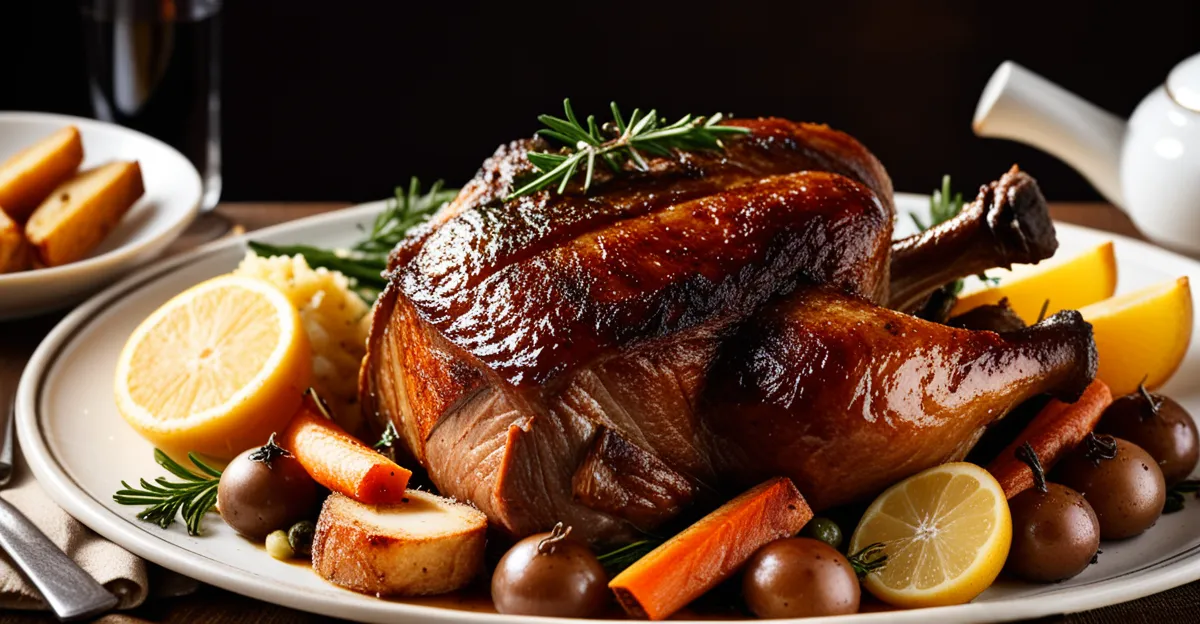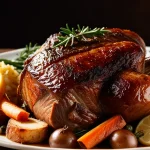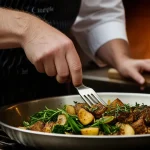Essential Components of a Traditional Sunday Roast
A traditional Sunday roast is a festive British meal built on a harmonious balance between meat, accompaniments, and rich gravy. The roast meat, whether beef, lamb, chicken, or pork, forms the centerpiece, offering deep flavors and satisfying textures. Accompaniments such as roast potatoes, Yorkshire puddings, and seasonal vegetables complete the plate, adding variety and freshness.
The essential Sunday roast ingredients rely heavily on quality and seasonality. Using fresh, local produce keeps the meal authentic and enhances each element’s taste, from crisp roast potatoes to tender carrots and parsnips. The choice of meat, its quality, and the accompanying herbs or spices also make a significant difference, ensuring the final dish embodies the classic British Sunday roast heritage.
Have you seen this : How Can Traditional UK Cooking Incorporate Modern Sustainability Practices?
Historically, the Sunday roast has roots in British tradition as a communal meal after church services, a time to gather and share. This cultural significance is still celebrated today, making the Sunday roast more than just a meal—it’s a cherished ritual. Understanding these core components is essential for recreating an authentic experience, blending tradition with the comforting appeal of home-cooked goodness.
Classic Roasted Meats for Sunday Lunch
Mastering the roast beef recipe starts with selecting quality beef, preferably a rib or sirloin cut. Season simply with salt and pepper, then roast at 220°C (425°F) for 15 minutes to sear the exterior. Reduce heat to 160°C (320°F) and cook for approximately 15 minutes per 450g (1 lb) for medium-rare. Resting the beef for 15 minutes locks in juices, ensuring tenderness.
Also to discover : How can you incorporate seasonal fruits into British desserts?
The roast chicken recipe requires careful preparation for crispy skin and juicy meat. Pat the bird dry, season inside and out, and roast at 190°C (375°F) for 20 minutes per 450g (1 lb), plus an extra 20 minutes. Basting occasionally keeps the chicken moist.
For lamb, the roast lamb recipe involves marinating in garlic and rosemary or seasoning simply before roasting at 200°C (390°F) for 25 minutes per 450g (1 lb) for medium-rare. Let it rest for 15 minutes before carving to preserve succulence.
Finally, the roast pork recipe benefits from scoring the skin and seasoning well. Roast at 220°C (425°F) for 30 minutes, then reduce to 180°C (355°F) and cook for 25 minutes per 450g (1 lb). Rest the meat for about 10 minutes.
Each of these traditional Sunday roast meats offers distinct flavours and textures, integral to the authenticity of the British Sunday roast, embodying comfort and cultural heritage.
Traditional Accompaniments and Sides
Crucial to any traditional Sunday roast recipe are the accompaniments, which transform the meal into a hearty feast. Perhaps the most iconic is the Yorkshire pudding recipe, made from a simple batter of eggs, flour, and milk. Cooked in hot beef drippings, these puddings puff up to golden perfection and soak up gravy beautifully.
The art of preparing roast potatoes lies in achieving a crisp, golden crust with a fluffy interior. Parboiling the potatoes beforehand and shaking them gently in the colander roughs up the surface, allowing for maximum crispiness once roasted in hot fat.
Classic Sunday roast vegetables often include carrots, parsnips, and green beans. Carrots and parsnips are typically peeled, cut evenly, and roasted until caramelized, adding natural sweetness and depth. Green beans are usually steamed or blanched to maintain their vibrant color and tender crunch.
Using fresh, seasonal vegetables not only enhances the plate but retains the authenticity of the British Sunday roast. These accompaniments blend textures and flavors, perfectly complementing the rich meats and gravy that are the meal’s heart.
Gravy and Sauces for the Perfect Finish
The rich homemade gravy recipe is indispensable to any traditional Sunday roast recipe. It begins by collecting the pan drippings after roasting meat, which carry intense, caramelized flavours. These drippings are then combined with flour or cornstarch to form a roux, gradually whisked into stock to achieve a smooth, thick consistency. Carefully simmering enhances depth without bitterness.
Making roast dinner gravy requires attention to texture and taste balance. A well-made gravy should coat the back of a spoon, offering a velvety, savoury complement to meats and accompaniments. Adjust seasoning, adding salt, pepper, or herbs to suit the dish.
Sunday roast sauces add character and contrast. Traditional options include mint sauce alongside lamb, apple sauce with pork, and horseradish for beef. These sauces bring a fresh, tangy acidity that brightens the plate and highlights each meat’s unique flavour.
Incorporating these gravies and sauces elevates the British Sunday roast experience, completing the meal with harmony and indulgence. Attention to these sauces ensures your Sunday roast is not just hearty but memorably flavoursome every time.





